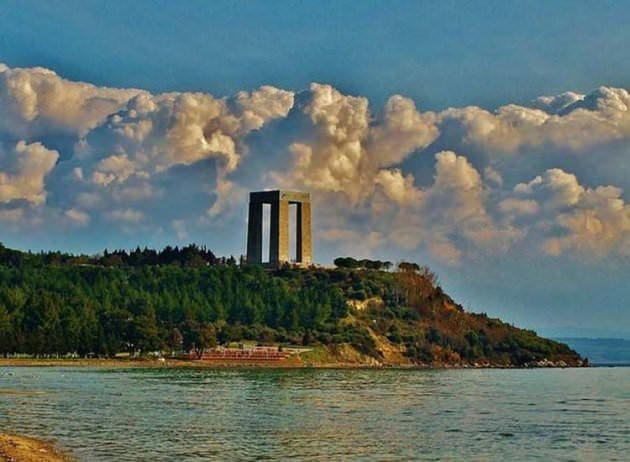
Çanakkale: 530 417
Turkey on March 18 commemorated the 103th anniversary of the Ottoman Empire’s World War One victory over Allied fleets that were attempting to break through the Strait of Dardanelles in the northwestern province of Çanakkale.
A number of commemoration events took place across Turkey to pay respect to the fallen soldiers in the Dardanelles battle.
Visitors flocked to Çanakkale’s İskele Square to attend commemoration events.
Activities and programs were held by the Çanakkale Governorate, the Gallipoli Historical Area Presidency of the Gallipoli Campaign, as well as various institutions and organizations, attracting a lot of photographs of the war ships that were anchored.
Citizens who visited the city center showed great interest in the “Cold Sculpture Animation Event” organized by the Provincial Directorate of Culture and Tourism.
In the event, the sculptures of legendary Trojan characters, such as Hector, Paris and Achilles, as well as the ancient Greek bard Homer, attracted great interest.
Turkey has had great success in its fight against terrorism in the al-Bab and Afrin regions of Syria, similar to the Battle of Çanakkale (Gallipoli), when the nation made history 103 years ago, President Recep Tayyip Erdoğan said on March 18, speaking at a ceremony held at the “March 18 Stadium” in Çanakkale to mark Çanakkale Victory and Martyrs’ Day.
Erdoğan was referring to the Battle of Çanakkale, which took place in the province’s Gelibolu (Gallipoli) district in 1915 and marked a turnaround in favor of the Turks against the Allied forces during World War One.
“Today we know very well the meaning of this struggle against terrorist organizations and the forces behind them, both inside and outside our borders,” Erdoğan said.
He said “the waves of terror against Turkey” were nothing other than efforts to revive the Çanakkale campaign a century later.
“We have defied those who think they have created a terror corridor along our border,” Erdoğan said, referring to the Turkish Armed Forces and Free Syrian Army (FSA) success in Syria’s Afrin town center.
Turkey launched “Operation Olive Branch” on Jan. 20 to clear Afrin of the People’s Protection Units (YPG), a group Ankara considers a terror organization for its links to the outlawed Kurdistan Workers’ Party (PKK).
Fierce battle on the Dardanelles
The Allies in World War One attempted a naval breakthrough in March 1915 through the Dardanelles with the aim of capturing the Ottoman capital of Istanbul and securing a much-needed sea route to Russia. After a number of British and French capital ships were either sunk or damaged, however, the Allies were forced to abandon the naval campaign.
The Ottomans’ initial naval victory in March was soon followed by an amphibious landing on the peninsula. Better known in the West as the “Gallipoli Campaign,” the ensuing land warfare lasted from April 1915 to January 1916 and ended with the Allies’ complete withdrawal from the area.
The Gallipoli battle also marked the rise of Atatürk, who served there as an officer. Around one million troops, including many Australians and New Zealanders, participated in trench warfare in Gallipoli, which is regarded as a defining moment in the history of the Turkish people, as well as a milestone in laying the foundations of a sense of national identity for Australia and New Zealand.